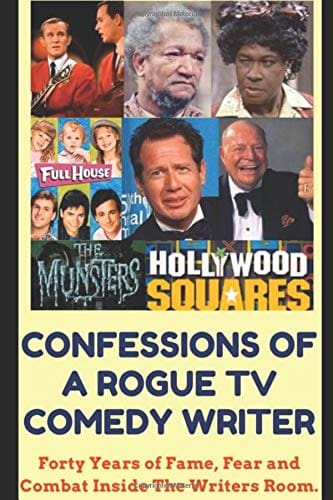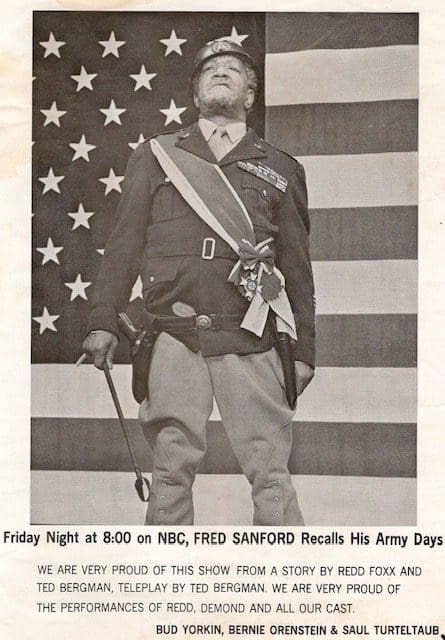
Ted Bergman was kind enough to sit down with The Pop Break to discuss his latest book: Confessions of A Rogue TV Comedy Writer: Forty Years of Fame, Fear and Combat Inside the Writers Room.
Over the course of his long career, Ted has written for The Munsters, The Smothers Brothers Comedy Hour, Sandford and Son, What’s Happening!, Gimme a Break, Full House, and worked on numerous pilots.
The transcript below has been edited for clarity.
Your first writing job was on The Munsters episode “The Most Beautiful Ghoul in the World.” What inspired you to write that episode?
Ted Bergman: I knew that I loved comedy and I had an aunt- who wasn’t a real aunt. She was one of those friends of my parents who you call aunt. She was, for almost her whole career, an executive secretary for some of the big movie producers and happened to be working at Universal. I was probably 23-24 at that time. She was working next door to a production company that was making a weird show and she brought me the pilot script because she knew that I was interested in television and comedy. I read it and thought you know I think I can do that.
At that time, we had just gone to the moon and came back, all that astronaut stuff. So, I wrote a teleplay. It took me almost two months because I basically didn’t really know what I was doing. And my aunt took it over to the production company. They called me and said, “Hey, we like the way you think. We can’t do this story because it would be cost prohibitive.”
Universal invited me in. I didn’t have an agent. I didn’t have anything. Just sat down and say how about this, how about that.

How did you get into comedy writing full time?
Ted Bergman: About a year later, I was a probation officer. My agent called and said the Smothers Brothers are looking for material.
However, your first job as a staff writer was on the Hollywood Squares. What was that like?
Ted Bergman: It was a stepping stone for me in that the first joke that I ever got on the air. Charley Weaver, Cliff Arquette, the jolt of dopamine, adrenaline hearing the audience laugh at something that fell out of my head made me feel like that’s what I wanted to do. That’s where I wanted to go for sure. I was there for two months on the show, when I got the call for Smothers Brothers and left there. It doubled my weekly salary.
If I remember correctly, you were only at the Smothers Brothers for one year.
Ted Bergman: They were going in a different direction. The year that I was there, we were nominated but didn’t win an Emmy. The next year, the guys brought in all these young writers, Steve Martin and Rob Reiner. They were all younger than me, 22-23. They had never written anything. I felt they were more controversial, but we wrote funnier stuff. I feel that comedy is rule number one that’s what gives you the soapbox.
There is no doubt about it. The Smothers Brothers were pioneers. The Smothers Brothers in a way was in the wrong place in the wrong time.
I’m the biggest fan of Jon Stewart that there is. I never missed a show and he’s articulated this in interviews. We’re just comics. Our number one rule is “Is it funny?” We’re not a news show. If it’s not funny, we don’t have another license.
Who are your comedic influences?
Ted Bergman: In those days, I loved George Carlin even early on.

Hippy Dippy Weatherman or when he started getting more political.
Ted Bergman: Both. I liked the looseness of him. I know now that to prepare he would spend hours to prepare. I liked his attitude. I like his confrontational, liberal, fuck you all [attitude].
Another early influence is Woody Allen. I’m a big fan of Woody Allen’s. I can quote some of his stuff, big fan of the early movies, Bananas. There were others, but I think probably (Jonathan Winters). I guess my earliest one was Jack Benny, but the characters they created on that show were so wonderful to me.
After Smothers Brothers, you worked for Jonathan Winters, and then Sanford and Son. How did you get the job on Sandford and Son?
Ted Bergman: I got into Sanford and Son on a spec script. At the time, I was selling perfume. I was really broke. I did have an agent, a real shark.
It was Helen Kushnick, who is best known for being Jay Leno’s agent during the original Tonight Show scandal.
Ted Bergman: She was really good for me at the time. She was really aggressive. I had to do something or I was going to go study for a real estate license. God help me.
I knew I could get it to them, but I had to write something really special. I couldn’t come up with a story and then there were these two Japanese girls at the elevator in my apartment building and they were starting a catering service and the lightbulb went off about Japanese food. I thought about putting him in a traditional Japanese home with Japanese food, so that’s the script I wrote and it jumpstarted my career.
The first year I was there, I was the only writer on the show other than the producers.
Were there any black writers writing for Sanford and Son or any of those other shows with a predominantly black cast?
Ted Bergman: Yes, but very few. In fact, there were a couple of guys, Ilunga Adell and Calvin Kelly, very young just starting out wrote for Sanford and Son. But there were a lot of writers, well-known writers, who came in because it was such a big hit. We did a lot of freelance and brought in a lot of freelance writers, which was more the rule than it is now. All the shows are almost all staff writers.
The freelance writer in television is an anachronism by now. We would bring in Lucy writers, Jack Benny writers, Danny Thomas and Beverly Hillbillies and all these hit shows. And I was surprised at many of them because we were not as controversial as All In the Family or The Jeffersons. We were more of a cartoon show. We tried to stay away from the old sitcom surprise party.
Norman Lear once said something to me. I will never forget it. He said the first rule in story is if someone can leave the room just by walking through the door. It’s not a story. What we meant by it is if the solution is easy, it’s based on contrivance, mistaken identity, which was a lot of sitcom stories in those days. So those people would come and we were very surprised because in the ’80s, things were changing.
Also, during that time, you got a reputation as the writer who writes for black shows.
Ted Bergman: It’s because the network people, the producers who aren’t comedy writers, but are mostly businessmen, executives — they go by not who you are, but what you are. “Oh, he just came off of Sanford and Son, he must know how to write for black [shows].”
No, I’m a nice little Jewish boy from the San Fernando Valley. I went to an almost all white high school. I would write what I thought was funny and let the cast decide whether they thought that was funny or not. There were a number of things that I didn’t know about and I learned.

